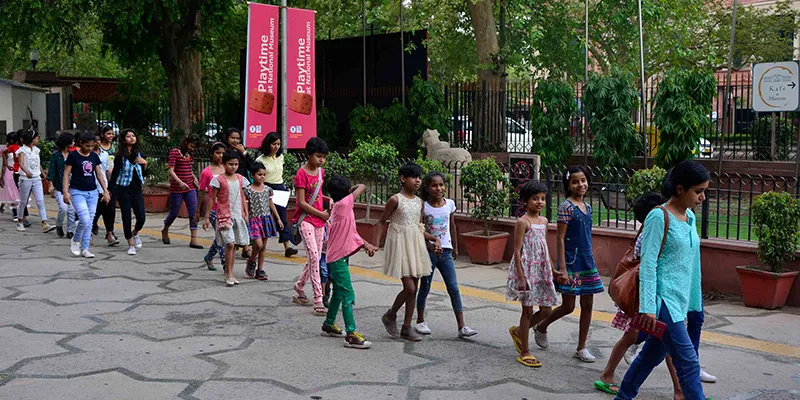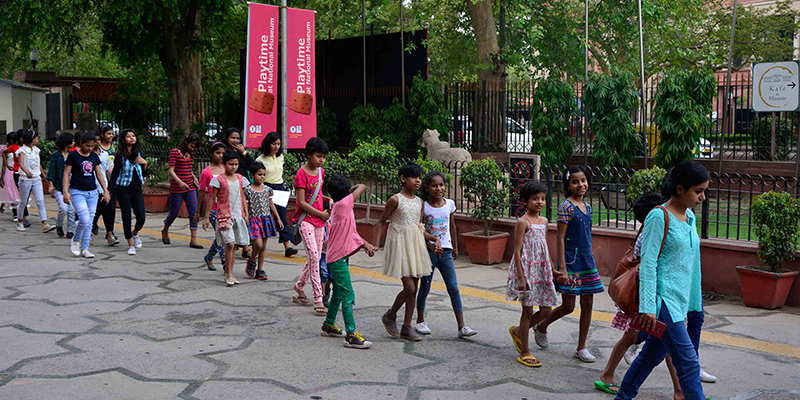Online heritage encyclopaedia Sahapedia is offering free culture walks for the differently-abled
Non-profit Sahapedia has partnered with Axis Bank Foundation to organise a series of nationwide heritage walks to help people gain a deeper understanding of their cities and towns. Nearly half of these tours will be planned and curated exclusively for disabled people and underprivileged children.
“Saha” is Sanskrit for “together with”: Sahapedia extends an invitation to explore together the richness of India’s cultural landscapes. An online resource on the arts and culture of India, Sahapedia has been conducting heritage walks in many cities for the past one year. Conducted by experts for history enthusiasts and for those who love the city, the primary aim of these walks is to create awareness and engagement with a city’s heritage. With a growing network of professionals across the country, Sahapedia conducts free-of-cost walks in more than 16 cities including Delhi, Agra, Ahmedabad, Bengaluru, Kolkata, Kochi, Varanasi, Pune, Mumbai, Bikaner, and Vijayawada.
“We realised that the entry point to culture and heritage for majority of enthusiasts is through travel. Heritage walks have recently become the favourite method for explorers to engage with space, and Sahapedia’s heritage walks are based on various facets of the city’s history, culture, architecture, art, food, and other such themes, to ensure that there is something for every heritage lover,” says Vaibhav Chauhan, Founding Secretary of Sahapedia.
From exploring museums, historical monuments and markets, to natural landscapes and areas known for rich cuisine, Sahapedia’s walks are also curated thematically, focussing on architectural heritage or women and gender-related issues, with specific visiting groups in mind, such as students, travellers, corporate teams, and so on. Sahapedia’s aim is to make heritage engagement programmes more holistic and inclusive.

In one of its first major initiatives in art and cultural philanthropy, the Axis Bank Foundation has tied up with Sahapedia to support a series of nationwide heritage walks — a project aimed at helping people gain a deeper understanding of the material, cultural and built heritage of their cities and towns. The foundation will fund around 200 fully guided walking tours organised by Sahapedia over a period of one year, nearly half of which will be planned and curated exclusively for disabled people and underprivileged children.
The aim is to make this effort multi-faceted and inclusive. Tailor-made engagement programmes are curated for disabled individuals and for children from disadvantaged backgrounds, to highlight their problems and indicate the need to alter the heritage spaces to make them more inclusive. Sahapedia has organised walks in sign language as well. They plan to cater to different groups in collaboration with specialists such as sign language experts and venues wherever the facilities for these groups are available.
Sahapedia will organise the India Heritage Festival in February, 2018. The month-long festival is planned to be an annual event wherein multiple heritage walks will be conducted across India. It will focus on the diverse aspects that make up the cultural fabric of the country, such as food, heritage, nature, and art.
Sahapedia partners with other non-profits and educational institutes and has conducted walks and programmes for Salaam Baalak Trust, Koshish foundation, Macquarie University, St. Stephen’s College and Lady Shri Ram College, to name a few.
One of Sahapedia's key projects, just completed, is an 11-volume documentation of the Rashtrapati Bhavan: it covers aspects such as the president’s bodyguards, presidential retreats, landscape and architecture, interiors and artworks, flora and fauna. The organisation has also recently done a cultural mapping of Fort Kochi and Mattancherry, documenting a circumscribed area of historical importance, to trace institutions and practices, languages and cultures, communities and lifestyles. This can be accessed at their cultural mapping website.
Sahapedia wants to do many such projects in the near future. Rather than a forum meant only for scholars talking to each other, Sahapedia has now become a platform for researchers, teachers, tourists and general enthusiasts of every category. To this end, it has initiated other activities such as baithaks and conversation between different groups on diverse aspects of culture, heritage and the arts.
Website: https://www.sahapedia.org











![[Product Roadmap] How Practo evolved from being a SaaS platform for doctors to a full-fledged healthcare ecosystem](https://images.yourstory.com/cs/2/a9efa9c02dd911e9adc52d913c55075e/product-road-map-1598948141466.png)